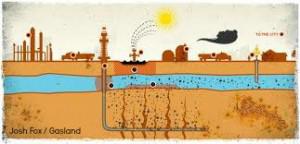Moves to safeguard water amid proposed fracking may not be enough

 Hydraulic Fracturing, also known as “fracking,” is a technique in which typically water is mixed with sand and chemicals, and injected at high pressure into rock to create small fractures. These fractures then allow for the extraction of liquids like gas or petroleum.
Hydraulic Fracturing, also known as “fracking,” is a technique in which typically water is mixed with sand and chemicals, and injected at high pressure into rock to create small fractures. These fractures then allow for the extraction of liquids like gas or petroleum.
The process is water-intensive, using up to 24 million litres of water per frack, according to Jolynn Minnaar, an independent journalist and fracking researcher. For every four million gallons of water used in fracking, up to 330 tons of chemicals are also injected into the ground. These chemicals, which include carcinogens and hydrochloric acid, contaminate both the water supply and air, said Minnaar during a recent talk at Stellenbosch University’s Faculty of Medicine and Health Sciences.
“We also need to consider the natural elements found in the shale bedrock itself that return to the surface along with the original chemicals” said Minnaar, who recently directed the documentary film, “Unearthed,” about fracking-related contamination and public health consequences in the Untied States.
Among these naturally occurring elements are heavy metals and radioactive elements such as arsenic, mercury, lead and uranium.
Currently, there are more than 180 bans or moratoria on fracking worldwide.
Safeguarding South Africa’s scarce water?
Water and Environmental Affairs Minister Edna Molewa’s announced on Monday that an intention to declare fracking a controlled activity in terms of South Africa’s Water Act.
“What this means is that fracking becomes a water use, thus requiring a water use license,” said Molewa during a Wednesday press briefing. “In this regard only matters concerning water resources will be of consideration when licenses are issued, including but not limited to the possible impact of substances and chemicals on the ground water resource.”
The public will now have 60 days in which to comment on the move.
Jonathan Deal, from the Treasure Karoo Action Group (TKAG), has accused government of rushing to pursue fracking’s socio-economic benefits– such as job creation and alternative energy sources – without considering the long-term environmental impacts.
“We are concerned that there is a lack of understanding in our government around the issues of shale gas mining,” Deal told Health-e. “We are concerned that in desperation to provide jobs, deal with the energy problems, and raise revenue for the country that our leaders are trying anything to show that they are doing a good job, to ensure their votes in the election next year.”
Deal added that there had been no public consultation around fracking and that task teams assigned to investigate fracking in South Africa has been working in secret.
“Fracking does not only scar the environment, it poses a real health threat to surrounding communities,” he stressed. – Health-e News Service.
Author
Republish this article
This work is licensed under a Creative Commons Attribution-NoDerivatives 4.0 International License.
Unless otherwise noted, you can republish our articles for free under a Creative Commons license. Here’s what you need to know:
You have to credit Health-e News. In the byline, we prefer “Author Name, Publication.” At the top of the text of your story, include a line that reads: “This story was originally published by Health-e News.” You must link the word “Health-e News” to the original URL of the story.
You must include all of the links from our story, including our newsletter sign up link.
If you use canonical metadata, please use the Health-e News URL. For more information about canonical metadata, click here.
You can’t edit our material, except to reflect relative changes in time, location and editorial style. (For example, “yesterday” can be changed to “last week”)
You have no rights to sell, license, syndicate, or otherwise represent yourself as the authorized owner of our material to any third parties. This means that you cannot actively publish or submit our work for syndication to third party platforms or apps like Apple News or Google News. Health-e News understands that publishers cannot fully control when certain third parties automatically summarise or crawl content from publishers’ own sites.
You can’t republish our material wholesale, or automatically; you need to select stories to be republished individually.
If you share republished stories on social media, we’d appreciate being tagged in your posts. You can find us on Twitter @HealthENews, Instagram @healthenews, and Facebook Health-e News Service.
You can grab HTML code for our stories easily. Click on the Creative Commons logo on our stories. You’ll find it with the other share buttons.
If you have any other questions, contact info@health-e.org.za.
Moves to safeguard water amid proposed fracking may not be enough
by wilmastassen, Health-e News
September 6, 2013
MOST READ
Cough syrup recall: What is diethylene glycol and what happens when you drink it?
Hunger and mental health: study looks at how families cope with food insecurity
Patients wait months for surgery at Leratong hospital as non-payment shuts down theatres
Social media for sex education: South African teens explain how it would help them
EDITOR'S PICKS
Related


Your genes could predict your future, but would you want them to?

